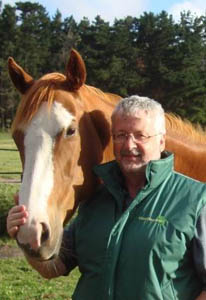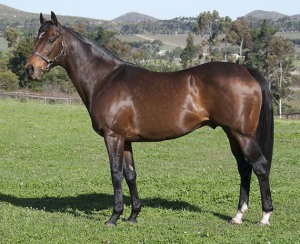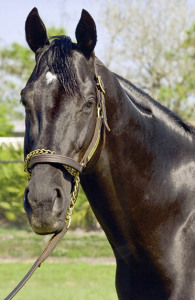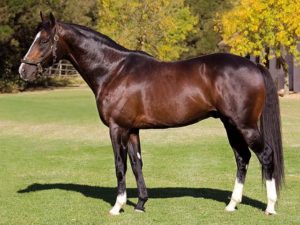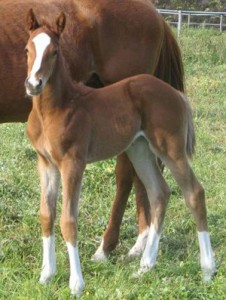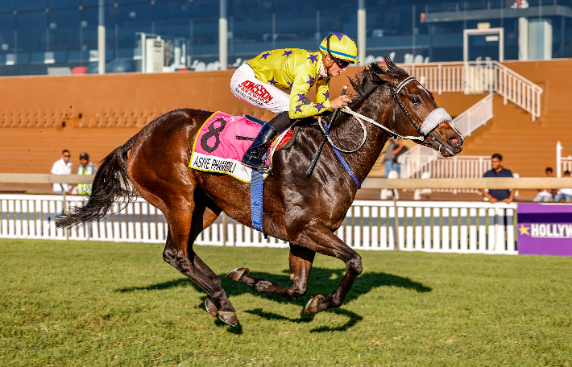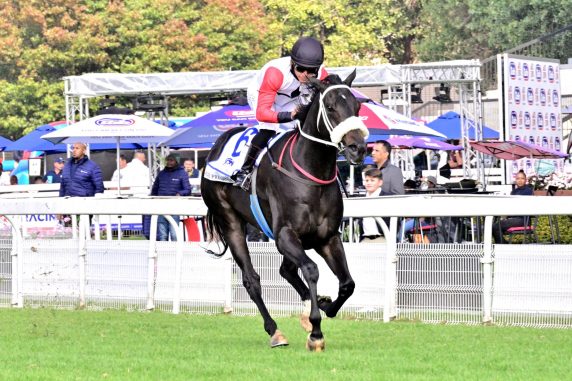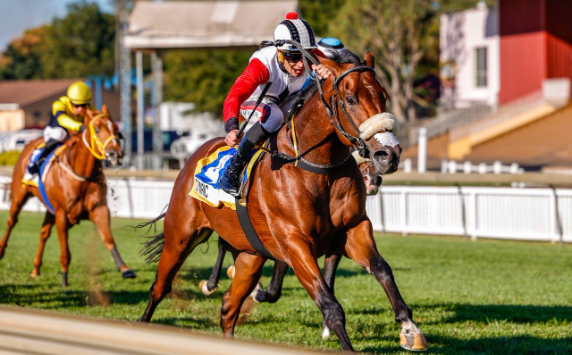Prominent bloodstock agent David Allan is a well known figure to anyone who attends the South African or international yearling sales circuit. Not only is David a leading bloodstock agent, but he is also involved with a number of the Cape’s most exciting young stallions and he is a loyal supporter of the South African racing and breeding industry.
He was interviewed by the Cape Breeders Club recently.
How did you get involved with the sport?
I followed racing very closely for many years since childhood watching black and white TV and picking several Grand National winners in a row. I caused parent complaints when I took a group of 12 year olds at a boarding school where I was teaching to evening races. After university I moved to live in Japan for what turned out to be 18 years. For most of that pre-internet time I had The Sporting Life air-speeded daily and latterly bought my first filly in England then mares from Ireland and UK for Japanese breeders in the then new (and brilliant) JHRA sponsored import scheme which has now brought Japan to having some of the top rated horses in the World.
Do you come from a racing/equestrian background?
No but as a small child my father took me on Sundays to the spectacular Van Horse Parades in Regent’s Park, to see the Household Cavalry and above all to a huge RSPCA “Home of Rest for Horses” – meaning for horses that used to pull things – where I grew up in North London. There would be long queues of people with carrots just to come in and see over 100 retired horses on Sundays. I got very involved and a love of the horse grew and grew.
What motivated you to get into the bloodstock world and who were you early mentors?
People told me I had “an eye” but I needed to learn a lot especially from Newmarket trainer Chris Wall and revered bloodstock agent Joss Collins of the BBA. Lyn Alexander, agent, later stud manager and brilliant horse and African animal painter guided me as well as did her late partner Patrick Clarke. As I got deeper into stud and racing management, the list of people helping me lengthened. Aside from some vultures (that’s unfair to vultures actually), there are many helpful people in bloodstock in UK/Ireland/USA, all conscious of the need to help new (human) blood into the game. I hope that I have done and continue to do the same thing myself.
When did you first come to South Africa and get involved with Allan Bloodlines?
Allan Bloodlines dates a long way back but I first came to South Africa with serious bloodstock intentions in the early 2000’s buying our first runner and winner at the old Equimark ReadytoRun and soon importing my own stallion LAKE CONISTON, using him as a means of learning the SA market-place.
I had bought him from Coolmore and stood him in Newmarket for a couple of seasons. Sticking L-plates on my back and standing him in the Cape was an exciting enterprise. LAKE CONISTON did me proud because we syndicated him partially at Odessa with Lionel Cohen, to whom Anton Procter had introduced me for the purpose, then sold him entirely at a good price. Sadly the main buyer soon passed away and the horse then had a good life firstly with Terry and Annabel Andrews at Sorrento then in Gauteng til the end of his days.
With the great help of Anton and young Grant Knowles then at the TBA, both knowing the ropes in the UK, we mustered “Allan Bloodlines/TBA” annual parties (twice) of breeders to visit Tattersalls December Sales with everything organised. A lot of hard work by hosts and visitors alike, a lot of fun, ouch my head, and much has flowed from that effort over the years since.
You currently manage a number of stallions in South Africa. Touch on your hopes/plans for them?
That they all sire a Gr1 winner and go on from there!
Some, in the earlier years, have come to me to help in creating a stable profile, dealing consistently and I hope helpfully with breeders and as a by-product, contributing to a profile for Allan Bloodlines. More recently, one such has moved to Oldlands – STAGELIGHT. It is a source of astonishment that a Guineas winning son of the great stallion and sire of sires MONTJEU was not promoted by his owners.
Now he has plenty of Oldlands foals on the ground that confirm his class and we go on from there. In addition, I am fortunate to have been engaged to promote and manage the syndicates for some young stallions and to promote and perhaps syndicate others. You are going to ask me about ELUSIVE FORT I know plus WHERE’S THAT TIGER is a superb prospect as witnessed by breeder support in 2014. ROCK OF ROCHELLE is as exciting as any newer stallion in the country in both my biased and unbiased opinions and GITANO HERNANDO is about as rich in quality and value as any international multiple Gr1 winner could be.
You must be thrilled with Elusive Fort’s start at stud. How has the support been for him this last season?
He covered 108 mares with 93% tested in foal.
Working with Klipdrif is an excellent professional experience. In my office, liaising with syndicate principal Peter de Beyer, we set a clear scale of fees including a popular volume arrangement, we handle all contracts, invoicing, collections, covering certs etc digitally and more or less instantaneously and the farm communicates and reports perfectly (with so many enquiring breeders as well as with us) whichever of us does the actual mare booking. The horse could have covered more, but he was looking very busy for the final weeks and we all want him for the long haul, so we called it. Actually he handled everything perfectly and we – most importantly Bennie and Shane who have him looking outstanding – now know him inside out. Enquiries for next season are many already. I expect we shall set his 2015 fee in March/April time. More than exciting!
Gitano Hernando is a really well performed young sire with plenty to offer breeders. How are his first yearlings looking and how is the support going?
As the recently deceased Mandy Rice-Davis famously said “He would say that wouldn’t he” but I can say that the stock on the ground is generally strong, well grown, balanced, handsome and endowed with good bone. The parallel with SILVANO is uncanny in their breeding and international Gr1 winning similarities and it took a moment or two for that great sire to get weaving towards championship status. Maybe the GITANOs will kick in more quickly, but anyway I was very keen to use him myself. Changing farms before track performance never helps, but he has covered a good book to follow his good book at Maine Chance (who still support him) and The Alchemy has him looking simply fantastic. Anton Shepherd and James Armitage were kind enough to call him the best looking stallion they saw on their tour and they were not alone. I anticipate a further upward curve after his first yearlings have been seen.
How did you get involved with Kirsten Rausing and is she an active buyer in SA?
I had known Miss Rausing probably initially from breeding to Selkirk and assorted encounters at lunch parties a long time ago. At a meeting at Royal Ascot one year I proposed a way of picking up the pieces and supporting her home-bred ALADO, a Danzig member of one of the greatest stud book families who had been brought to South Africa at the suggestion of an agent but things had not worked out.
Kirsten runs (herself – hands on and somehow ever present) not only a global business and numerous thoroughbred industry activities but also her three studs in England and Ireland, standing five stallions and amounting to a magnificent owner/breeding operation that is immensely valuable to the industry. She can’t stretch her time any farther – hence me and hence any kind of an operation in South Africa – but has been a buyer of mares here and continues to allow me to refresh the broodmare band that supports ALADO in addition to the core of breeder support that he enjoys.
What does Allan Bloodlines offer prospective clients, and how do they get involved?
I am delighted with our progress over the past dozen years or so especially in stallion management and consignment promotions, and in managing racing groups, and our and other people’s breeding stock. I am doing gradually more broodmare band analysis for farms or individual breeders as well. But the delight is principally because I had set my sights on modern, emerging South Africa and now feel part of our industry here with many friends. We are launching a brand new low-cost Racing Group costing about R 1,500+VAT per month for an interest in two well bred fillies in the Cape which can be a springboard to greater involvement or not, but – above all – in our racing management role in SA and abroad we are known for communicating, guiding and generally looking after people however much they are spending and however much they know or don’t know. To get involved please call me on 072 740 9061 or email [email protected] and/or look at this web page http://www.allanbloodlines.com/hintlesham-sa.php
Breeding stock purchasing and management is a big part of what we do, north and south. I am fortunate to have been asked to buy a steady stream of mares and fillies from UK/Ireland at a commercial SA budget, sometimes putting them in foal southern time up there. Our trade in SA-based mares is increasing as well. This plus on-going management and protection of breeder clients is something that makes me tick.
Promotion/marketing is a major part of our modus operandi. We do it when employed to do it for stallions and farms and we do it as a natural extension of how we go about the thoroughbred business.
What is the biggest difference for you in operating in South Africa compared to overseas?
Without a doubt it is in the buying of yearlings. Firstly there is no right or wrong. “When in Rome” is the apt expression. But the differences are worth knowing for the future. The industry here does not embrace the Bloodstock Agent/Consultant for that purpose, with a small number of very notable exceptions. At Tattersalls’ yearling sales over 2/3 weeks, something like 6% are signed for by trainers. 80% plus are signed for by Bloodstock Agents/Consultants and/or Racing or Syndicate Managers, most of whom are providing Sales Company Credit to their clients who have no interest in bothering to apply for credit (“Why buy a dog and bark yourself?”). Plus a monster service of inspections, pedigree and future family research, budget assessment, coordination of vetting, mating assessments etc. Research is influenced by 30% plus yearlings being sold by foal pinhookers, 30% plus being sold by professional consigners i.e. who do that job for a living, leaving a minority being sold by breeders. Somewhere in there are many boarding studs who sell for clients and do not charge sale commissions on year round boarders.
Often trainers are not involved at all – the top ones rarely ever being sighted at sales. Others come to the sale to look at short lists and contribute if they are already known to be the intended trainer. If actually leading the effort for a client or on spec, the trainer will generally use his/her agents to present alternatives and spend a lot or a little time at the sales with them. One of our best trainers declares himself not to be a judge, which is his excuse to avoid sales. Of course there are exceptions who look at everything but only a few in the top echelon. I am asked every year by a good Newmarket trainer to buy at my favourite Irish sale “two or three that I and my owners would like” with a budget guideline and a few taboo sires. They see them when they arrive, sometimes a couple of months later after pre-training that we organise.
At Allan Bloodlines, measured over about the last ten years we are running at 74% winners to purchases/selections and 94% winners or placed north and south.
We have recently seen cases at CPYS of purchases and bidding at the top end where no trainer is involved. Good spotters go ahead and look at everything regardless of sire, consigner, and within reason pedigree. The managing agent joins in. In Allan Bloodlines’ case, we then assemble a short list influenced by budget estimates and have genetic analyses run on the matings of the best individuals thereafter deciding what to have vetted. Only then, do we have a short list to discuss with clients whether principals or trainers or both. Or for ourselves to buy a future broodmare or pinhook.
Trainers are the de facto bloodstock agents in South Africa for yearling analysis and buying. If export protocols are resolved and the market opens up, an interesting new breed of multi-cultural buyers may descend on our SA sales grounds. That will require a different sort of spotting by vendors! We might start a consignment company…..
Those buyers will learn another big difference. Buy a yearling (say) Newmarket in October, start and cantering many of them within a couple of weeks, go straight on in pre- or full training with or without some Spring grass time on a farm depending on how precocious. Action for owners straight away.
Has racing/breeding in this country changed much, and if so, since you came to South Africa?
That is a huge question but the short answer is “yes in certain areas”.
The things that are worse are generally political or regional (and confrontational), with seemingly no effective central authority to bring parties together. Such things do resolve themselves, but there is blood on the carpet before the cleaners are called in. I am a half-full glass not half-empty and look forward to resolutions. In the meantime, production standards have risen greatly including the majority of “smaller” breeders presenting at sales. And I don’t mean “more forward” which is not always a good thing. I just mean better and bloody good. Looking forward as we must, I hope to see changes such as better more vibrant mare sales, a proper weanling sale of substance, and the sort of change in which I am involved with some farms in adjusting pedigree quality looking 3-5 years ahead at a time.
How big is your team currently?
Yoshi and I ourselves own 15 broodmares in South Africa of which 10 are 100% ours and 5×50-75%. Plus their followers. Some of the mares are fillies I bought as yearlings here and have raced, some imports and a few “second hand”. I manage a further 12 mares in one project and a few others for overseas players. I want to grow the broodmare trade and management side further. I own or manage only 9 in training right now including a couple out on lease, but we have sold more in recent years as yearlings or bred/pinhooked into Ready to Run Sales both as principal and as breeding or pinhooking manager. The in-training number will increase later this year and although we are no longer part of the Balmoral organisation, I imagine we shall have 8-12 in Ready to Run Sales in Cape-based expert preparation under our ownership or management – and marketing.
What do you look for when buying mares for stud purchases?
Black type in the first and second dams which become the second and third dams of progeny. Or a young first dam with good matings to start her. Good doesn’t necessarily mean fashionable. Established broodmare sires plus new broodmare sires with big female lines. I am wary of multiple Stakes winning fillies – partly because of price of course but so many turn out to be less than brilliant at stud, either because of poor but expensive matings or because “too butch”. I love buying unraced fillies and mares (on a budget) if there is a good reason as they are so often more relaxed as producers and their record as a category is good if mated well.
I was taught many years ago to put my hand across a page blotting out everything below the second dam before researching further. Old families can still be good, but often are on the wane. I have adjusted to the SA respect for multiple winning mares. Being harsh, a filly winning say five races non-black type is simply proving she isn’t good enough for black type. In “the north”, one win is enough unless capable of greater things. The overriding point is that SA prize money is better against cost than UK’s, so it makes sense and is good fun to keep on winning! However in both north and south, a winner of three handicaps could be quite lowly rated, so it is important to research the actual rating of the filly/mare as a runner and her progeny. All takes time!
How do you board your mares with and do you have anything on offer at upcoming sales?
Most of ours are with David & Sandy Hepburn-Brown at Hemel ‘n Aarde. Along with other clients there we are part of admirable development, growth and great friendship. We also board at Klawervlei, The Alchemy and did at Arc En Ciel until closure when stallions and a number of mares moved. We have good working relationships with other studs as well and work with them on their broodmare bands. If we double our managed mare population we shall both increase at our main base and spread!
We shall offer a few at CTS March and The Nationals, as well as at Ready to Run Sales to be finalised when the calendar is fixed. I am involved in the promotion of other people’s stock at all sales such as farm consignments where we are employed to do so, and the progeny of “our” stallions. Quite busy.
You have a number of horses with Vaughan Marshall. What makes him such a good trainer in your opinion?
History in the game – diligence – long productive hours working – horsemanship – integrity – friendship – international knowledge – 27 x Gr1s – cricket and rugby expertise and a proper appreciation of food and wine, of which he will now be required to buy me a lot.
How many trainers do you use in SA and Britain in total?
Directly right now? 6 with a few other close trainers “between horses” for us, pending new syndications.
Do you have shares in horses available at the moment?
Yes. We have memberships in Hintlesham Racing’s Racing Group Alpha running in colours that have won on Met Day and on many other occasions in SA as well as in UK. For a bit under R 1,500 +VAT per month, involvement with two new well-bred fillies sharing the stake money and receiving constant communication, social visiting and racing opportunities while being well looked-after. http://www.allanbloodlines.com/hintlesham-sa.php
Are your family involved in Allan Bloodlines?
My wife Yoshi is vocal on the pedigree side of life and is invaluable at sales looking after visitors and similarly in London. As our business in South Africa involving FaceBook and Twitter has grown, she becomes more involved being a Facebook expert (one might say addict) with thousands of friends round the world. My daughter is very allergic to horse dust/dander and is in film, TV and theatre production in London and abroad thus living out the other side of her Dad’s genes.
Which international sales do you attend?
Yearlings August-October plus extras: Doncaster, Tatts Ireland, Goffs, Tatts Books 1/2/3/4 (not all) and December. Optionals: Keeneland September, Arqana, Osarus but rarely have time. Send a friend! Baden Baden next on the menu.
Breeding Stock Nov-Dec: Absolutes are Goffs Foals and Breeding Stock; Tatts December Foals and Breeding Stock; Arqana sometimes. Keeneland if I can.
Mixed Sales: Tatts February, Goffs February, Tatts July
Plus Tatts Horses in Training Sale in late October which runs for a week after several weeks of yearling sales.
Impacted upon by 3 x SA ReadytoRun Sales that were early October (ugh – but upward curves there), late October, early November.
What are your thoughts on breeding/racing in South Africa, and do you see the export protocols changing anytime soon?
Enough general thoughts already I think!! But on your latter question: Yes. Start from two ends of the thought process: (1) it CANNOT go on like this forever, it just CANNOT, so when is ANYTIME SOON? And (2) there is a general realisation that (a) what has happened at whatever cost for a couple of decades has not worked (b) righteous indignation bullishly telling the rest of the world that they don’t understand and have the wrong rules does not work and entrenches negativism abroad (c) we in SA are affecting ourselves negatively in overseas eyes in declaring (correctly) AHS outbreaks, by publicising other internal bloodstock conflicts and in attacking each other on moves allegedly made or not made. However logical the “obvious” quarantine arrangements would be as and when the test is ratified (and trusted internally as well as internationally), that alone will not do the job. Maybe sport horses and The Olympics will do the job. Maybe a single receiving country will break the barrier. Maybe progress with the EU which is deferred to by so many other receiving countries will be made through thoroughbred science and expert diplomacy now in place, held back by funding delays. The plan is a very good one and needs to be implemented. In a very small way I am part of the team, straining to be let loose on the diplomatic/goodwill front overseas at ten times the unofficial level at which I operate now.


